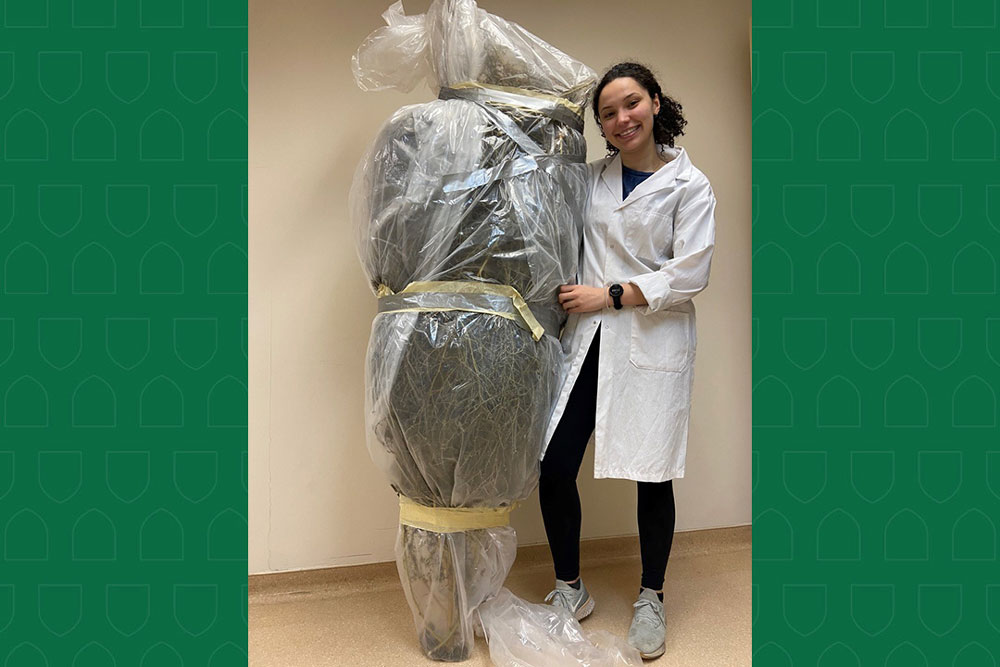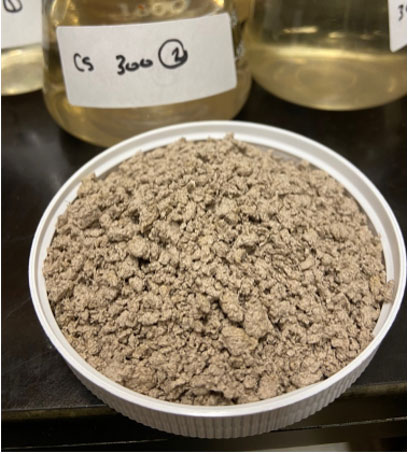
USask graduate grateful for experiences as a Schulich Leader
Olivia Stewart (BSA’24), who received a Schulich Leader Scholarship in 2020, graduated from USask with a Bachelor of Science in Agriculture degree (honours) during Spring Convocation in June 2024
By Shannon BoklaschukWhen University of Saskatchewan (USask) graduate Olivia Stewart (BSA’24) received a telephone call four years ago informing her that she was one of Canada’s newest Schulich Leaders, the good news came as a big surprise.
While Stewart had applied for the prestigious Schulich Leader Scholarship “with high hopes” of being selected, she didn’t “have a lot of expectations” about the outcome. However, in 2020, during the global COVID-19 pandemic, Stewart was thrilled to learn that she was the recipient of an $80,000 Schulich Leader Scholarship.
“There was initial excitement and shock, genuinely,” she said.
Through The Schulich Foundation, the Schulich Leader Scholarships are awarded to 100 entrepreneurial-minded high school graduates enrolling in a science, technology, engineering, or mathematics (STEM) undergraduate program at 20 partner universities in Canada, including USask. Recognizing the increasing importance and impact that STEM disciplines will have on the prosperity of future generations, businessperson and philanthropist Seymour Schulich established the scholarship fund in 2012 to encourage the best and brightest students to become Schulich Leader Scholars: the next generation of entrepreneurial-minded technology innovators.
Currently, half of the awards are valued at $120,000, for engineering scholarships, and half are valued at $100,000, for science and math scholarships. Every high school in Canada can nominate one graduating student each year to apply for the scholarship.
Stewart, who is from Toronto, Ont., graduated high school from Pearson College in Victoria, B.C., before moving to Saskatoon and enrolling at USask. She was selected for the Schulich Leader Scholarship for her outstanding academic achievements in science and innovation in creating her first aquaponics system with a 20-gallon tank. To further her knowledge in the area, as a high school student she volunteered for a local company to learn more about large-scale aquaponics operations.

Stewart began her studies at USask in the College of Arts and Science in the fall of 2020 and then transferred to the College of Agriculture and Bioresources. Nearly four years later, during USask’s Spring Convocation in June 2024, Stewart received her Bachelor of Science in Agriculture (honours) degree in agricultural biology, with a minor in agribusiness.
Walking across the stage at Merlis Belsher Place to receive her degree was a proud moment for Stewart and her family members, who travelled to Saskatoon to attend the Convocation ceremony.
“It was just one of those things that you kind of think about conceptually and you know it’s going to happen at some point soon, but it’s different walking on the stage and having all the people there,” she said. “It was really cool. It was a full-circle moment.”
Stewart chose to study at USask so that she could follow in the footsteps of her parents, who previously studied at the university. USask’s global reputation as a leader in agricultural education and research was also a significant factor in her decision.
“I wanted to study agriculture from the best,” she said.
Throughout her undergraduate studies, Stewart found many benefits to being a Schulich Leader. In addition to the scholarship funding, which covered the cost of her tuition, textbooks, and more, Stewart appreciated being a part of a close-knit group of Schulich Leaders at USask. Stewart and her fellow Schulich Leaders regularly engaged in knowledge sharing and took part in networking opportunities and social outings together, such as a trip to a local trampoline park.
“I think the Schulich Scholarship, especially at USask, is a really interesting opportunity to have a really personal group,” she said. “There’s only a handful of us, so we’re very well connected and there’s definitely a social base there; I would say a big chunk of my social support came from the Schulich group.”

Since graduating from USask, Stewart has returned to Toronto and is considering her next steps post-graduation. Stewart is particularly interested in learning more about agriculture and textiles, and how plant matter can be used to produce environmentally friendly, sustainable clothing. Through her undergraduate thesis project at USask, she demonstrated that a common weed found in Saskatchewan—kochia—is a viable source of cellulose that “should, and can, be used if it were to be developed.”
“My original focus was turning tumbleweeds into t-shirts,” she said. “I was able to suggest that it was possible, which I think was really cool in terms of how we navigate the climate crisis and going into agriculture in the next 10 years.”
In 2023, Stewart had the opportunity to travel to London, England, to attend a conference that focused on textiles and the future of alternative materials and innovative fabrics. That conference, in conjunction with her honours thesis work at USask, made Stewart realize that she should continue to learn and work in the area of sustainable textiles and bioprocessing. She is now looking at possible options to study abroad.
Stewart is grateful to The Schulich Foundation, which encouraged her to pursue her love of science at the post-secondary level through the support she received through the Schulich Leader Scholarship. She is also grateful for the positive experiences she had at USask and in the College of Agriculture and Bioresources.
“I came here to learn and am grateful to be leaving with a clear focus on what the future can become,” she said.
Together we will support and inspire students to succeed. We invite you to join by supporting current and future students' needs at USask.
Article re-posted on .
View original article.

